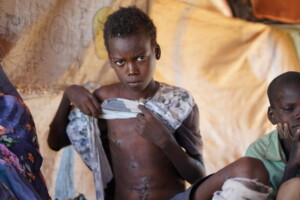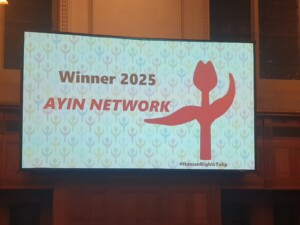Dabanga Sudan satellite blackout ‘shows Sudan’s repressive media agenda’
Sudanese journalists and media experts have condemned the suspension of the Dabanga Sudan satellite programme by Egyptian satellite service company Nilesat on February 18, after Khartoum made a complaint about the news channel to the Egyptian authorities.
 People watching television at a cafe in Wadi Halfa, Sudan (Pinterest)
People watching television at a cafe in Wadi Halfa, Sudan (Pinterest)
Sudanese journalists and media experts have condemned the suspension of the Dabanga Sudan satellite programme by Egyptian satellite service company Nilesat on February 18, after Khartoum made a complaint about the news channel to the Egyptian authorities.
Sudanese Minister of Information Ahmed Bilal Osman confirmed in an interview that the Sudanese government issued a complaint about the Dabanga Sudan satellite programme to Egyptian authorities which resulted in the suspension of the 24/7 news channel on Sunday, February 18, at 4pm Sudanese time.
The Egyptian satellite service company Nilesat shut-down the uplink of the 24/7 Dabanga Sudan satellite programme to its channel on Eutelsat – a satellite service at the same position – and because the suspension took place without prior notice to Radio Dabanga or its service management system, the channel went dark until a new frequency at Eutelsat allowed transmission to resume the next day at 1pm.
The change has required Dabanga Sudan viewers to re-tune their satellite receivers to the new frequency.
‘Incitement’
Minister Bilal Osman recently accused Radio Dabanga of “incitement” and “causing instability in Sudan”, in an interview with daily newspaper El Mijhar. “Frankly, we have an agreement as Ministers of Information that any channel that broadcasts calls for incitement against any Arab country on Arabsat or Nilesat should be dealt with.”
The Minister said that in this regard, the government filed a complaint to Arabsat Broadcast Services in May 2015 that caused the suspension of the Dabanga Sudan channel. Last month the government filed the same complaint to Nilesat, which also suspended Radio Dabanga’s satellite broadcast.
“As a result of our request, our Egyptian brothers responded to us in this framework,” Bilal Osman said.
'The suspension disclosed the full security and media agenda of the media Ministers against independent voices.' – JAHR
In response to the suspension of the Dabanga Sudan satellite programme on Nilesat, the Sudanese Journalist Network for Human Rights (JAHR) said that the shut-down at the instigation of the Sudanese Ministry of Information “was an expression of its non-acceptance of other opinions and independent voices”.
JAHR coordinator, journalist Faisal El Bagir, told Radio Dabanga yesterday that what Minister Bila said has disclosed the full security and media agenda of the media Ministers against other voices that differ from their opinion. “Especially if this voice expresses the ‘voice of the voiceless people’ in Sudan.
“Radio Dabanga is known to have won the confidence of large parts of the Sudanese population, especially in Darfur, for its distinguished reporting and high professionalism.”
El Bagir added that the coordination among information ministers by depriving people in the region of independent voices “means that these ministries are dedicating the sovereignty to the government’s propaganda media, instead of opening up the Arab space for professional and independent broadcasting”.
Attack on press
The journalist said that this decision signals a fierce attack that he expects to be staged in the coming period against independent news websites and newspapers in Sudan. “The role of social media will remain strong and deliver any message, whatever the pressure and attempts by the Sudanese government to close the open spaces in the region.”
Sudan remains near the bottom of the Reporters without Borders (RSF) World Press Freedom Index, in which it is currently ranked 174th out of 180 countries. Facing heavy censorship, many print newspapers have shifted to digital formats to circulate censored or banned material on their websites and social media pages, press freedom NGO Freedom House reported.
During past years, the National Intelligence and Security Service (NISS) upgraded its already severe restrictions on press freedoms by restoring pre-publication censorship and issuing a number of 'red lines' on matters that are not supposed to be covered by the media. The 2009 Press and Publications Act allows for restrictions on the press in the interests of national security and public order, contains loosely defined provisions related to bans, and holds editors-in-chief criminally liable for all content published in their newspapers. More repressive amendments to the Act were made in November last year.











 and then
and then